- Home
- David R. George III
Crucible: McCoy Page 8
Crucible: McCoy Read online
Page 8
“Incredible,” the first officer declared, and Kirk looked down at the creature. As he watched, its smooth flat surface transformed, becoming uneven and bumpy, as though the side upon which it landed had pushed through to become the visible side. Bits of its glistening body still quivered, and its thickest part gradually rose and fell once. “Not only should it have been destroyed by our phasers, it does not even register on my tricorder.” That fact, Kirk understood, explained why neither the ship’s sensors not the landing party’s tricorders had detected the existence of the creatures.
“Captain,” Yeoman Zahra said, “it doesn’t even look real.” Kirk had to agree. The creature resembled nothing more closely than a melted piece of plastic.
“It is not life as we know or understand it,” Spock said. “Yet it is obviously alive, it exists—”
“And it can bear up under full phaser power,” Kirk said, realizing that, even if this one creature had been stunned, the landing party’s weapons provided little ability for them to protect themselves. The creatures’ apparent resistance to phaser fire might also account for why the Deneva colony had been unable to ward off the invasion of their world.
“Captain,” Spock said, “I suggest we risk taking it aboard.” Kirk did not like that idea, any more than he liked being in an enclosed space and so near to these creatures.
“It’s too close in here, it may be a trap,” he said, deciding that he needed to protect his crew. They’d come here seeking some notion of what had happened on Deneva, and having found the creatures, Kirk wanted to withdraw to safety and formulate a plan of action. “Let’s move out.”
The landing party headed back toward the stairs, Tiroli leading them back the way they’d come, his phaser pistol held out before him. The security guard ascended the steps, Scotty and Zahra behind him, Kirk and Spock in the rear. Tiroli quickly peered into the corridor through which they’d entered, then strode into it. As Scotty and Zahra followed, Kirk suddenly heard the squeaking of the creatures again. Before he could react, a loud smack filled the air, like the sound of flesh against flesh, and Spock grunted. Kirk spun around to see him stagger sideways, the first officer brushing the wall as he lurched backward down the stairway. As Spock fell onto his side, Kirk saw the creature on his back.
“Spock,” he called. “Spock!” The normally stoic Vulcan groaned again and again, his voice pained as he dropped his tricorder. With unexpected speed, he rolled up onto his hands and knees, reaching behind him in obvious desperation to remove the creature from his back. Kirk reached for it as well, dropping to his own knees and grabbing for the edges of the alien, curling his fingers around the thin fringes of its body. It was slick and gelatinous, and Kirk felt himself recoil at the sensation, but he refused to let go. He pulled at the creature, and met strong resistance. Climbing back to his feet for leverage, he heaved again, and this time the thing came free. He hurled it aside, hoping that his efforts had not been in vain.
“It’s gone,” he told Spock, grabbing his shoulders, trying to help him up, trying to make sure that he hadn’t been harmed. “Can you stand?” he asked. “Spock, are you all right?”
He didn’t respond.
Kirk dropped to one knee and reached an arm around his friend’s shoulder and chest, hauling him upward. Spock’s eyes stared straight ahead, but appeared unseeing. His arms had spread as Kirk had lifted him, and now they hung in that position. All will seemed to have drained out of Spock.
A chirp sounded. Even as Kirk recognized the telltale communicator activation signal, he jerked his head around to search for the creature that had attacked Spock. It lay several meters away on the floor of the common, twitching minutely.
“Scott to Enterprise,” Kirk heard the chief engineer say.
“Enterprise, Sulu here,” came the response.
“Mister Sulu, we have a medical emergency,” Scotty said. “Notify sickbay, and beam up the landing party immediately.”
“Right away,” Sulu said, his tone reflecting the urgency of the request. In just seconds, the thrum of the transporter escalated around them. The gold motes of dematerialization filled Kirk’s eyes, and then he felt the hard, ridged surface of a targeting pad beneath his knee. Gently, he lowered Spock down to a supine position.
“Captain, Doctor McCoy is on his way,” said Lieutenant Kyle, the engineering and services officer now manning the transporter.
Around Kirk, the rest of the landing party dismounted the platform. “Your orders, Captain?” Scotty asked.
Kirk rose and stepped down onto the deck, where he faced Scotty, Zahra, and Tiroli. “Maintain orbit,” he said, recalling something that Aurelan had said to him earlier. “My sister-in-law talked about the creatures forcing the colonists to build ships for them. Keep the planet under constant surveillance, and if any ships try to reach space…” Kirk paused, uncomfortable with the order he was about to issue, but knowing he had little other choice. “If any ships try to reach orbit, shoot them down. We cannot allow these creatures to move beyond Deneva.”
“Aye, Captain,” Scotty said gravely, and he turned and headed for the bridge.
“Yeoman Zahra, Mister Tiroli,” Kirk said, “report to the exobiology lab. Give a complete description of what we encountered to Doctor M’Benga. See if he’s got any theories about any of this.” Zahra and Tiroli acknowledged their orders and left.
Kirk looked over at Lieutenant Kyle, standing behind the transporter console, then back at Spock. He saw no change in the first officer’s vacant stare. Every few seconds, Spock’s body shuddered and he emitted a tortured groan.
“Where’s McCoy?” Kirk said under his breath, deeply concerned for Spock. He squatted down and studied his face. Though he appeared conscious, Kirk could see no hint of his personality there. This, it seemed perfectly clear, must have been what had happened to the colonists…to Peter, to Aurelan, to Sam.
Kirk felt numb. Spock lay before him, possibly dying, just as Peter also lay dying in sickbay. Sam and Aurelan had already gone.
And Edith, he added, despite fighting to keep the thought away. All the universe had been put right when he had prevented Bones from saving Edith, but from that moment on, his own life had begun to unravel. How could he—
The doors to the transporter room opened with a swoosh, and Kirk turned to see McCoy entering with Nurse Chapel. Two orderlies, Althouse and Shaw, followed behind with an antigrav gurney. Kirk stood as McCoy walked over to him.
“What happened?” the doctor asked. He handed his medical pouch to the nurse, then unslung the medical tricorder hanging from his shoulder. As Kirk described the events that had just taken place, McCoy retrieved the small, cylindrical scanner from its compartment in the tricorder and examined Spock. “I’m getting many of the same readings I got from your sister-in-law and nephew,” he said. “Excessive autonomic activity, severe pain, diminished reflexes, extreme stimulation of the nervous system, beta-band brainwaves even in an unconscious state—”
“Unconscious?” Kirk questioned, looking down at Spock’s open eyes. “I know that Vulcans sometimes sleep that way,” he said, “but—”
“Jim,” McCoy said, “indications are that Spock is in a deep state of unconsciousness, just short of coma.”
“What can you do for him, Bones?” Kirk asked.
“I don’t know yet,” McCoy said, “but there’s no risk in moving him, so I want to examine where the alien struck his back.” Kirk leaned down to help, but the doctor placed a hand on his arm and eased him out of the way. “Please, Jim,” he said quietly, then called to Nurse Chapel for her assistance. Together, they turned Spock over. McCoy then held out his hand, and Chapel deposited a long-handled instrument in it. The doctor activated it, a short, fine red beam appearing between two nodes at its end. With it, McCoy sliced through Spock’s uniform shirt.
As McCoy pulled the fabric away, Kirk stepped forward to look at Spock’s back. He saw a half-dozen small spots, centered between his shoulder blades and arranged in a roughly
hexagonal pattern. Ringed in the coppery green of Vulcan blood, they appeared to be puncture wounds.
McCoy raised his tricorder and its accompanying scanner, once more assessing Spock’s physical condition. When he’d finished, he looked over at Kirk. “Jim, I’m going to have to operate.”
“What is it?” Kirk asked.
“I don’t know,” McCoy said. “And I won’t know until I can get inside Spock.”
“Exploratory surgery,” Kirk said, more statement than question.
“Yes,” McCoy confirmed. “Spock told you that the aliens don’t show up on sensors, and whatever this one’s done to him, it doesn’t show up on my tricorder either. But it clearly penetrated his skin, and it must have done something to him internally. I need to go in and see if I can find the damage it’s done, and hopefully reverse it.”
“Are there any other options?” Kirk asked.
“I don’t think so, not for Spock,” McCoy said. “I also think that this is the best chance we might have to discover just what the aliens have done to the colonists.”
“All right, Doctor,” Kirk said, feeling that events continued to spin out of control around him. “Do what you can.”
McCoy moved out of the way and motioned to the orderlies. The shorter, gray-haired man and the taller, redheaded woman, both clad in blue medical-department jumpsuits, jockeyed the antigrav gurney up onto the transporter platform. They deftly rolled Spock onto his back again, then lifted him onto the gurney. As Chapel followed them toward the doors on the trip to sickbay, McCoy addressed Kirk.
“I’ll keep you informed,” the doctor told him. Kirk nodded and McCoy followed his staff out.
For a long moment, Kirk remained motionless, stilled by the anguish he felt. At last, he looked over at Lieutenant Kyle. “No one is to transport down to the planet without my authorization,” he said. He recalled giving a similar order when the Enterprise had been orbiting the world of the Guardian. Too late then, he thought angrily, and maybe too late now. Without another word, he headed for the bridge, mindful of what he’d already lost, and of what might yet be taken from him.
They’d done it, McCoy told himself for perhaps the hundredth time. He stood in sickbay over the sleeping form of young Peter Kirk, but all indications of the alien life-form within the boy had vanished. The diagnostic readouts above the biobed all read within normal ranges, and the modified medical tricorder he operated showed no trace of the living tissue that one of the neural parasites had deposited inside Peter’s body. According to the captain, the medical personnel sent down to Deneva from the ship had reported the same results observed throughout the colony.
Light, of all things, had been the solution. McCoy had operated on Spock and determined that the parasites attacked their humanoid victims by implanting tissue in their spinal columns. Once present in a host body, the tissue grew very rapidly, twining throughout the nervous system in a manner far too complex for conventional surgery to remove.
Afterward, Spock had learned to manage the pain and had retrieved one of the aliens from the planet’s surface. It had resembled nothing so much as an individual brain cell, and they’d concluded that the creatures, together with the tissue they embedded in humanoids, composed a greater organism, a vast hive-being connecting its component parts despite those parts not being in physical contact with each other.
Soon after, they’d discovered the creatures’ susceptibility to light. A wavelength too short for the humanoid eye to perceive had proven lethal to the individual aliens, as well as to the tissue inserted into host bodies. But that determination—that imperceptible light destroyed the creatures—had come only after experiments with the visible spectrum.
The doors in the outer sickbay compartment whispered open, and McCoy turned to see Jim enter. The captain quickly made his way over to Peter’s bedside. “Bones,” he said, looking down at his nephew, “how is he?”
“Recuperating,” McCoy said. “All of the alien tissue within him is gone.” He raised the modified medical tricorder, intending to indicate the source of his assertion. Once they had established the vulnerability of the parasitic tissue to light, they had required a means of verifying its obliteration within humanoid hosts. Dr. M’Benga had figured out how to do that, and he’d worked with Scotty and the engineering staff to adjust the ship’s inventory of medical tricorders accordingly. “He should make a complete physical recovery,” McCoy concluded, trying not to linger over the omission of a mental prognosis for the boy.
Jim nodded. “Has he regained consciousness?” he asked.
“Briefly,” McCoy reported. “A few hours ago. But his body’s been traumatized, and he’s physically exhausted. He needs to sleep.”
“Of course,” Jim said. “Did he ask about his parents?”
“No,” McCoy said. “He was only awake for a minute or two. He didn’t say much, other than to ask where he was and if he was all right.”
Again, Jim nodded. He seemed distracted, and McCoy understood at least some of what must be occupying his mind. In addition to Jim dealing with his own grief, he would have to tell Peter and his two brothers that their parents had been killed.
And then there’s Spock, McCoy thought, but immediately let the thought pass, not wanting to dwell on what had happened, not with Jim here. “What’s the situation on the planet?” he asked. McCoy knew that specially configured satellites had been seeded in orbit about the Deneva in order to bathe its surface in light deadly to the aliens. Jim had also told him that the efforts had worked as planned, though not to what extent.
“As far as we can tell, all of the creatures are dead,” Jim said. “Scotty’s got teams modifying the sensors on the ship and down in the colony so we can make sure of that. If we find any creatures still alive, we’ll use planetside transporters to beam them into a facility where they can be bombarded with light.”
“What about the colonists?” McCoy asked.
“Most of them appear free of the creatures now,” Jim said. “We’re setting up the hospitals so that they can positively identify every colonist, living or dead, scan them for the parasite, and treat them if necessary. A search will be done for any individuals not accounted for.”
“Do we know…” McCoy began, and then thought better of his question.
“How many died?” Jim finished for him, correctly inferring what he had been about to ask. “Approximately seventeen thousand so far. Most directly from the parasites, but some due to violence we believe was instigated by the creatures.”
“Does Starfleet intend to—” McCoy began, but then Peter stirred on the biobed. McCoy watched as the boy’s eyelids fluttered open. He still appeared very tired, but color had returned to his face.
“Peter,” Jim said quietly, leaning in toward his nephew. “Peter, it’s Jim. Your uncle.”
“Jim?” the boy said, and he adjusted his head on the pillow to look in the captain’s direction. His eyes took a moment to focus, and then he said, “Jim. What…what are you doing here? What happened?”
“It’s all right, Peter,” Jim said, lifting a hand to place it on his nephew’s shoulder, an action clearly meant to reassure the boy. “You’re all right.”
“Okay,” Peter said. Slowly, his eyes closed. McCoy thought that he’d fallen back to sleep, but then he dragged his lids open again. “Mom?” he said. “Dad?”
McCoy peered over at Jim, but the captain never took his gaze from his nephew. “They’re…” he started uncertainly. He cleared his throat, then began again. “They’re not here right now,” Jim said, obviously wanting to wait until the boy had regained more of his strength before telling him what had happened to his parents.
“Peter,” McCoy said. He waited until the boy had shifted his head to look up at him. “I’m Doctor McCoy,” he said. “You’re all right, but you need to sleep some more.”
“Okay,” Peter said, and he closed his eyes again. This time, they stayed closed.
Leaving the boy to rest, McCoy and Jim made thei
r way into the outer medical compartment. “Keep me informed of his progress,” Jim said as McCoy took a seat at the desk.
“I will, Jim,” he said.
As the captain headed for the doors, McCoy turned to the monitor on the desk, grateful that he’d escaped having to answer the one question he dreaded right now. But then Jim stopped and asked it. “Bones,” he said, “what about Spock?”
Without looking away from the monitor, McCoy said, “He’s in his quarters, Captain. We’ve confirmed that the alien tissue in his body has been eliminated.”
“And…his eyesight?” Jim asked.
McCoy felt a tightening in his gut.
Yes, they’d done it, he told himself again, but at what cost? Once they’d confirmed the powerlessness of the creatures against light, they’d needed to ascertain whether or not the same held true of the parasitic tissue within host bodies. Spock had volunteered to be tested, under the same conditions as the colonists would experience down on the planet—which meant that he hadn’t worn protective eyewear. In McCoy’s haste to find a means of annihilating the parasitic infestations, he’d utilized the whole spectrum of light, just as he had in his successful attempt to destroy the creature. Only later did he learn that he needn’t have done so, that only a wavelength of light invisible to humans and Vulcans need have been used. While the alien tissue within Spock had been wiped out, the first officer had also been blinded.
“No change,” McCoy said, still staring straight ahead at the monitor on the desk. He waited for Jim to leave, hoped that he would. Instead, he heard the captain’s footsteps moving toward him, then felt Jim’s hand on his shoulder.
“Bones, you can’t blame yourself for what happened,” he said. “It was circumstance. A need to save the population of Deneva.”

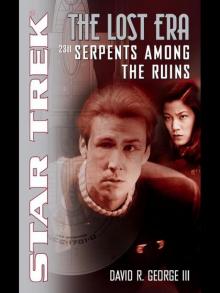 Serpents Among the Ruins
Serpents Among the Ruins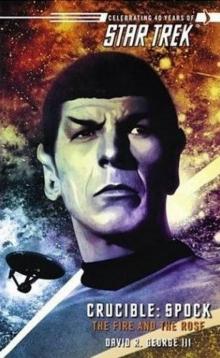 The Fire and the Rose
The Fire and the Rose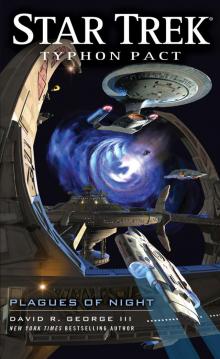 Star Trek: Typhon Pact 06: Plagues of Night
Star Trek: Typhon Pact 06: Plagues of Night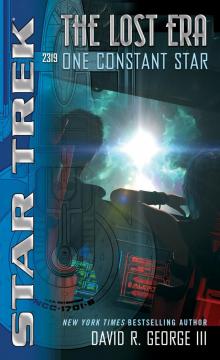 Star Trek: The Lost Era - 08 - 2319 - One Constant Star
Star Trek: The Lost Era - 08 - 2319 - One Constant Star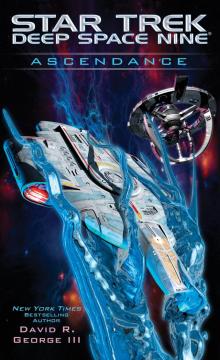 Star Trek: Deep Space Nine: Ascendance
Star Trek: Deep Space Nine: Ascendance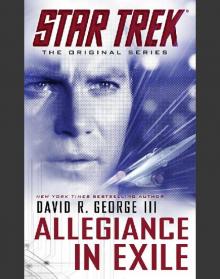 Star Trek: TOS: Allegiance in Exile
Star Trek: TOS: Allegiance in Exile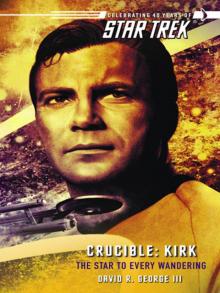 Crucible: Kirk
Crucible: Kirk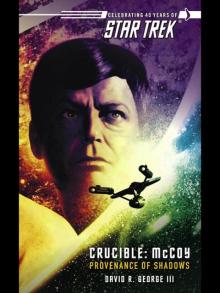 Crucible: McCoy
Crucible: McCoy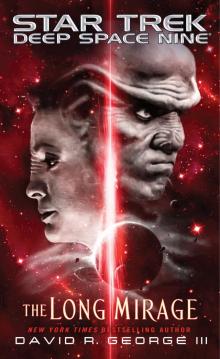 The Long Mirage
The Long Mirage Original Sin
Original Sin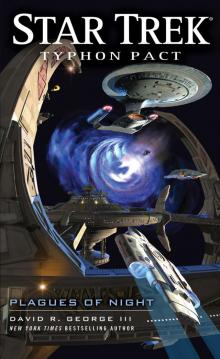 Star Trek: Typhon Pact: Plagues of Night
Star Trek: Typhon Pact: Plagues of Night Allegiance in Exile
Allegiance in Exile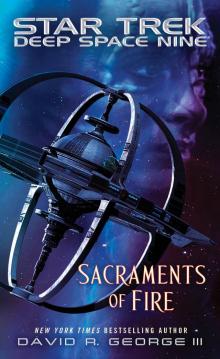 Sacraments of Fire
Sacraments of Fire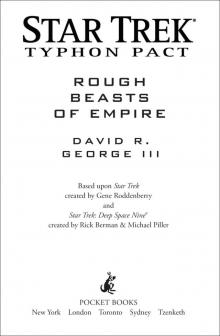 Star Trek: Typhon Pact: Rough Beasts of Empire
Star Trek: Typhon Pact: Rough Beasts of Empire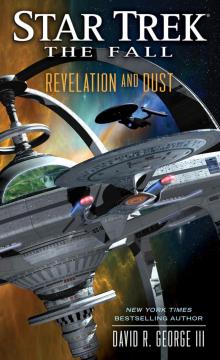 Star Trek: The Fall: Revelation and Dust
Star Trek: The Fall: Revelation and Dust